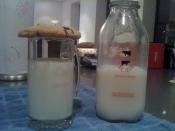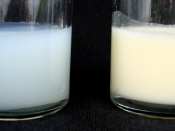Breast-feeding is more beneficial than bottle-feeding, not only for the baby, but for the mother as well. There are many reasons to promote breast-feeding. One such reason is the fact that the protein in the breast milk is easier to digest than commercialized formulas. Also, breast milk helps to prevent against things such as "gastroenteritis, respiratory infections, otitis media, some cancers, juvenile diabetes and allergic reactions." Breastfeeding also helps prevent against allergies. Breast milk can also prevent against dehydration due to lower levels of calcium, phosphorous, protein, sodium, and potassium than cow's milk. Fatty acids help brain development and vision. Breast milk is also easier to digest than cow's milk. There is also a lessened risk of SIDS (Sudden Infant Death Syndrome), no chance of overfeeding, it promotes good jaw development, as well as aiding in tooth development.
There are also many benefits for the mother, such as easier formula preparation, due to it always being the right temperature and being easy to travel with.
Breast milk is cheaper than store-bought formulas, and it aids in the mother's return to pre-pregnancy shape and uterine shrinking. Also, it is better for the environment, and helps to lessen postpartum bleeding.
For the first few days after birth, colostrum is present in the mother's breast milk, which contains antibodies that help prevent infection and disease, as well as allergies. Colostrum is also richer in vitamins and minerals, such as protein than mature milk. It is also slightly lower in fat, yet is richer in fatty acids.
However, bottle-feeding does keep the baby full for a longer period of time. This is due to the fact that formula contains more fat than breast-milk, and also breast-milk is thinner than formula. Breast-milk is also easier digested than formula, therefore, it takes longer...



Okay job not the best
somewhat breif you get your point across though.
7 out of 7 people found this comment useful.